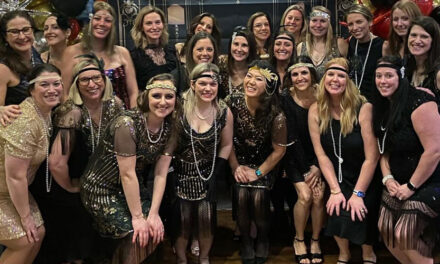Published October 23, 2019
By DAN TOMASELLO
LYNNFIELD — Lynnfield Middle School is starting to reap the benefits from the new Advisory program, a group of educators told the School Committee on Oct. 15.
Middle School Assistant Principal Tom Sallee recalled that the new Advisory program was launched this year as part of LMS’ improvement plan. He said the middle school piloted the program last year.
“Advisory is a time during the school day where students can meet with adults in small groups,” said Sallee. “The purpose of Advisory is to foster relationships between adults and students. It gives us a place to work through the different challenges that happen at the middle school level.”
After reviewing results from the 2017 Youth Risk Behavior Survey and the LMS School Climate Survey, Sallee said middle school officials and teachers came to the conclusion that students needed a new program that would support their social-emotional well-being.
“Students need to have the ability to talk about things that are bothering them and work on things such as anxiety, stress management and social conflict,” said Sallee. “It’s important for students to develop strong, positive relationships with adults so when they are having a conflict or a crisis, students will feel like they have someone they can talk to. We want every student in the building to feel like they have at least one adult they can trust. What we were getting from the survey data was that not everyone felt that way. We need to take steps to make that happen.”
Eighth grade English teacher Michelle Kane said the Advisory program is held from 7:45-8:15 a.m. every Thursday.
“It’s valuable time the kids are getting in their Advisory groups,” said Kane. “All of the teaching staff is assigned as an advisor across the various grade levels. Each Advisory group meets in a separate room or location such as the cafeteria, gym and classrooms. The administrators, school psychologists and the adjustment counselor rotate and act as substitutes when needed.”
Kane said the Advisory groups feature between 12 and 13 students.
“We wanted to make sure we had the right mix of kids to make sure the Advisory groups run well,” said Kane. “We want the kids to not only feel comfortable talking to an adult but also peers in the building.”
Eighth grade special education teacher Wendy Leone said most Advisory groups start with some type of an icebreaker or physical activity in order to increase student engagement.
“Students also have a say in what their Advisory looks like,” said Leone. “A lot of teachers will work with the students and ask them how they are feeling. I will ask the children if they want to rate how they are feeling on a scale of one to 10. They know they can always come and talk to me.”
Leone also said the Advisory program seeks to teach students important skills in a fun way.
“You need to have fun to make sure your relationship is growing with every student in your Advisory,” said Leone. “We do a lot of games in Advisory.”
Kane agreed.
“Every Advisory is slightly different because every kid is slightly different,” said Kane.
Leone noted a recent Advisory program theme was identity.
“We talked about where does a person get their identity and who tells you who you are,” said Leone.
Kane said the goal of the identity activity was to illustrate the fact students have more similarities than differences.
Leone also said the Advisory program “fosters relationships and cooperation.”
“The kids really do enjoy it and they really try to help one another succeed with whatever they are doing,” said Leone.
Kane said the Advisory program has improved teacher collaboration as well.
“It’s a way for us as a team to get together and discuss what our kids need,” said Kane.
SC reaction
After the middle school educators concluded their presentation, they answered several questions from the School Committee.
School Committee member Stacy Dahlstedt said the Advisory program “sounds phenomenal.” She asked if each Advisory group will be staying together going forward.
Sallee said the middle school has yet to decide if the groups will remain intact beyond this school year.
In response to a question from School Committee member Tim Doyle, Leone said general classroom teachers and exploratory teachers are involved with the Advisory Program.
“Different exploratory teachers are assigned to different grade levels,” said Leone. “I am a special education teacher and I don’t have any of my students in my Advisory group, which was purposeful. It allows my students to connect with another teacher and allows me to connect with students I might not interact with on a day-to-day basis.”
School Committeeman Phil McQueen expressed his support for the program.
“I think what you have done is really, really cool,” said McQueen. “It helps students develop connections with another adult.”
School Committee Chairman Jamie Hayman inquired why the middle school decided to hold the Advisory program on Thursday mornings.
Leone said the middle school decided not to have Advisory groups meet on Monday mornings because students are often tired from the weekend. She also noted Monday holidays would create logistical issues for the program.
“Students might be less willing to open up in the beginning of the week,” Leone added. “At the end of the week, they are more in the flow of things and are more willing to discuss things.”
Sallee concurred with Leone’s viewpoint.
“Wednesday is a terrible day to choose because it gets messed up once a month,” said Sallee. “We find the kids are more engaged in the morning. We are not married to it, but we are sticking with it for the year.”
Hayman acknowledged it took him awhile to understand students’ social-emotional issues have become a growing concern for educators. However, he believes there are some parents in the community who would prefer having students focus on academics instead of participating in the Advisory program.
“If you had the opportunity to address that parent, what would you say?” Hayman asked.
“I have been an educator for 15 years now,” said Kane. “I have seen a major shift in students’ ability to problem-solve in the classroom. I think social-emotional learning is integral in helping our students become more independent. They don’t have an ability to express their emotions. Therefore, it bogs down their ability to learn because they are focused on something socially that is going on.”
Sallee has heard a lot of positive feedback about the Advisory program from parents.
“I hear a lot from parents about how much their kids are enjoying it,” said Sallee.




